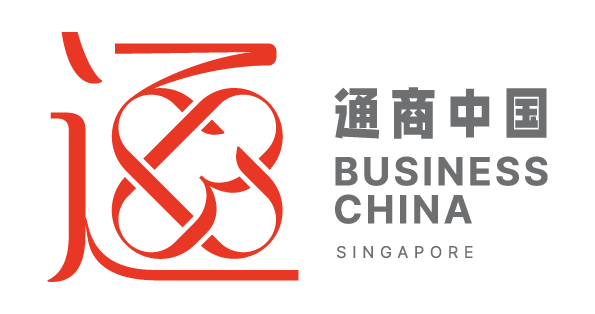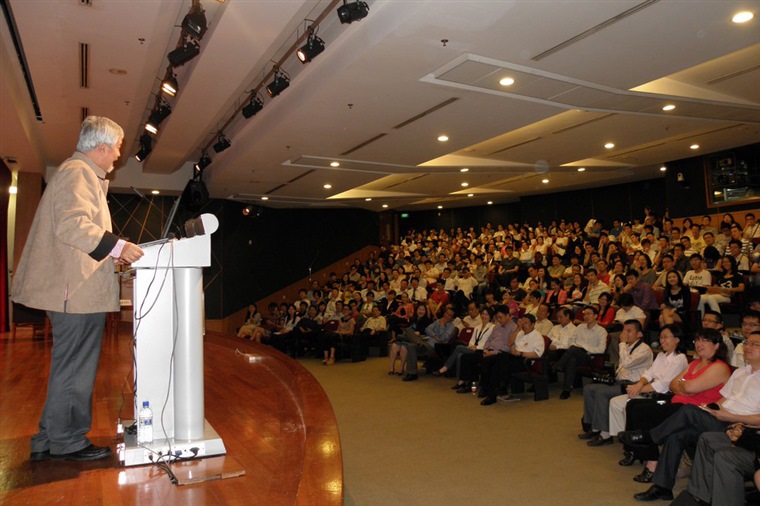Over the past two years, Weibo has become an essential part of life for many Chinese, especially among the younger generation. Reading, sharing and commenting on Weibo posts have now become the way in which people interact and share information with one another.
In a bid to understand more about the impact and influence of Weibo in relation to society today, Business China organised a talk “A Transforming China in the Age of Weibo” on 6 May 2012 at Civil Service College. The speaker for the day was Mr Xue Manzi, founder of UT Starcom and China’s top angel investor. As an active user on Weibo, Mr Xue has more than 2.6 million Weibo fans to date and possesses great insights on the functions of Weibo and the power that it wields.
The moderator of the talk was Dr Lan Weiguang, Founder and Managing Director of Sinomem Technology Ltd. The talk began with him sharing with the audience the story of how he became acquainted with Mr Xue through Weibo posts about environment pollution during the period when the National People’s Congress and People’s Political Consultative Conference were held. At the end of his introduction, Dr Lan welcomed Mr Xue on stage with thunderous applause from the audience.
Right from the start, Mr Xue did a short survey with the crowd: How many people are Facebook users? How many are Twitter users? How many are Weibo users? Hands rose across the auditorium as most of the audience admitted to having an account on most social media platforms. Mr Xue grinned at the results and replied cheekily, “All of you seem to have too much time on your hands.”
Xue Manzi is the second generation of leaders involved in revolutions in China. His father, Xue Zizheng was jailed during the Cultural Revolution in 1967 after which 15 year old Xue Manzi chose to join the army alone in Inner Mongolia, leaving his sheltered lifestyle behind and suffering through many hardships in the process. He later self-studied the English language, even memorizing an entire English dictionary. In 1979, riding on the wave of re-opened entrance examinations during the post reform period, Xue Manzi was admitted to the Chinese Academy of Social Sciences, studying History of Foreign Relations. Subsequently, he became the top student of China, earning him an all-expense paid scholarship from the University of California, Berkeley to study in the school of East Asian Studies, where he pursued his Master’s degree in History of Foreign Relations. In 1997, he became the second editor for books at the National Palace Museum Cultural Relics Publishing House.
During the period spent in the US, Xue Manzi got to know Sun Zhengyi and Lu Hongliang who eventually became fellow founders of UT Starcom with him. They proceeded to achieve excellent entrepreneur success, investing thousands at a go, but gaining billions in return. In 2008, Xue Manzi moved his family back to settle in China and started playing Weibo upon strong encouragement from a friend. He then started an awareness campaign in February 2011 on Weibo to bring attention to the kidnapping of children nationwide and forcing them to beg on the street for money. He wrote a six page long proposal on Weibo to eradicate such crimes which gained massive attention online and was shared furiously among online users, causing his number of fans to increase exponentially and pushing him to stardom on the Weibo platform.
Mr Xue mentioned that the influence of Weibo should never be underestimated. Through sharing of posts, one deceivingly weak voice can transform into thousands of voices singing the same tune and can even influence political decision making. With Weibo, “the Chinese have suddenly gained the ability to control their destiny”, said Mr Xue. As for himself, other than raising awareness about the child kidnapping crimes, which ultimately gained Premier Wen Jiabao’s attention, he is also actively using Weibo to do charity – raising 30 million yuan and gathering 20 thousand volunteers to provide free lunches for children left behind by their parents; raising awareness about the medical bills incurred by children living in poverty; collaborating with two other verified Weibo famous personalities Pan Shiyi and Zheng Yuanjie to call for reduction of PM2.5 emissions etc.
With public opinion voices amplified through Weibo, it naturally leads to concerns raised about government policies and also further discussion on Weibo. Mr Xue raised a few examples – In April 2012, the Qingdao government was said to have invested 4 billion yuan within a year to build a “Forest City”. The news led to much suspicion among the public as they questioned whether the advantages of this green project would better benefit the image of the government or the daily lives of local residents. After numerous shares on Weibo, the project was eventually halted. Other examples include the changing of Quanzhou Port’s name and the ban on big dogs in Harbin which all caused a huge uproar online and as a result the government has put a hold on these plans.
“It is necessary for the living environment to improve progressively”, states Mr Xue. “Even though Weibo posts can be marked or deleted, but with every three steps we take forward, we take another two steps backward. At the end of the day, we are still progressing.”
During the question and answer session afterwards, Mr Xue was met with overwhelming response from the highly enthusiastic audience.
One listener raised the issue of deleting Weibo posts about sensitive members involved in the Chinese political scene recently. Mr Xue replied that there are three types of people in this world – radical, mild and people who simply do not care. Weibo is a platform that encourages freedom of speech and flow of information. It is a platform that is worth preserving. He believes that it is essential to incorporate different points of views peacefully and rationally and further pointed out the importance of being patient and the significance of exposure on Weibo.
In relation to graduates’ entrepreneur ventures, Mr Xue said that it is not wise for newly graduated students to turn to entrepreneurship immediately. “Success is accidental, but failure is inevitable”, says Mr Xue. It is important for youths to spend a few years gaining experience, testing waters, rather than jump into the deep end right from the start. Despite vast potential present in the Chinese market, the best way to start a venture still varies “case by case”.
Upon seeing housewives, students, entrepreneurs and many others surging forward to ask questions, moderator Dr Lan was tempted to put forward a question for Mr Xue too. He compared the political models of Taiwan, Hong Kong and Singapore and asked which model the Chinese government would prefer. Mr Xue replied that China’s landscape is too vast, thus it is not suitable for any one political model. He also joked that while the Chinese people might prefer the Taiwan model, the Chinese government may be more inclined towards the Singapore model.
The talk concluded on a high note as Ms Low Yen Ling, CEO of Business China presented Mr Xue and Dr Lan with a souvenir plague each.
At a media interview afterwards, Mr Xue was asked about what he considered to be a good Weibo post. For him, an excellent post is not dependent on how many clicks or shares a post has but how many hearts were touched by that post. He also encouraged students to travel more and shared what he had learnt from his father, “Stepping out of our comfort zone serves to make us stronger. Just like the land which becomes more fertile after setting it on fire”. He further added that “for one to truly understand a country, one must stay in that country for a period of time in order to experience the lifestyle of locals there and also understand their social system.”
Qin Fang, one of the listeners at the talk, later reflected that the talk was very insightful and gave her a deeper understanding of Weibo.
Another member of the audience, Chen Jin An, said, “Even though I do not have a Weibo account, but through this talk, I now have a better understanding of Chinese media environment.”
The China Insights lecture series serves to highlight and explore issues affecting China and the rest of the world such as political, economic, cultural, social, business and technology. Invited speakers for the talks are professionals or academics from various fields of expertise, who come from China, Hong Kong, Taiwan and also Singapore.

